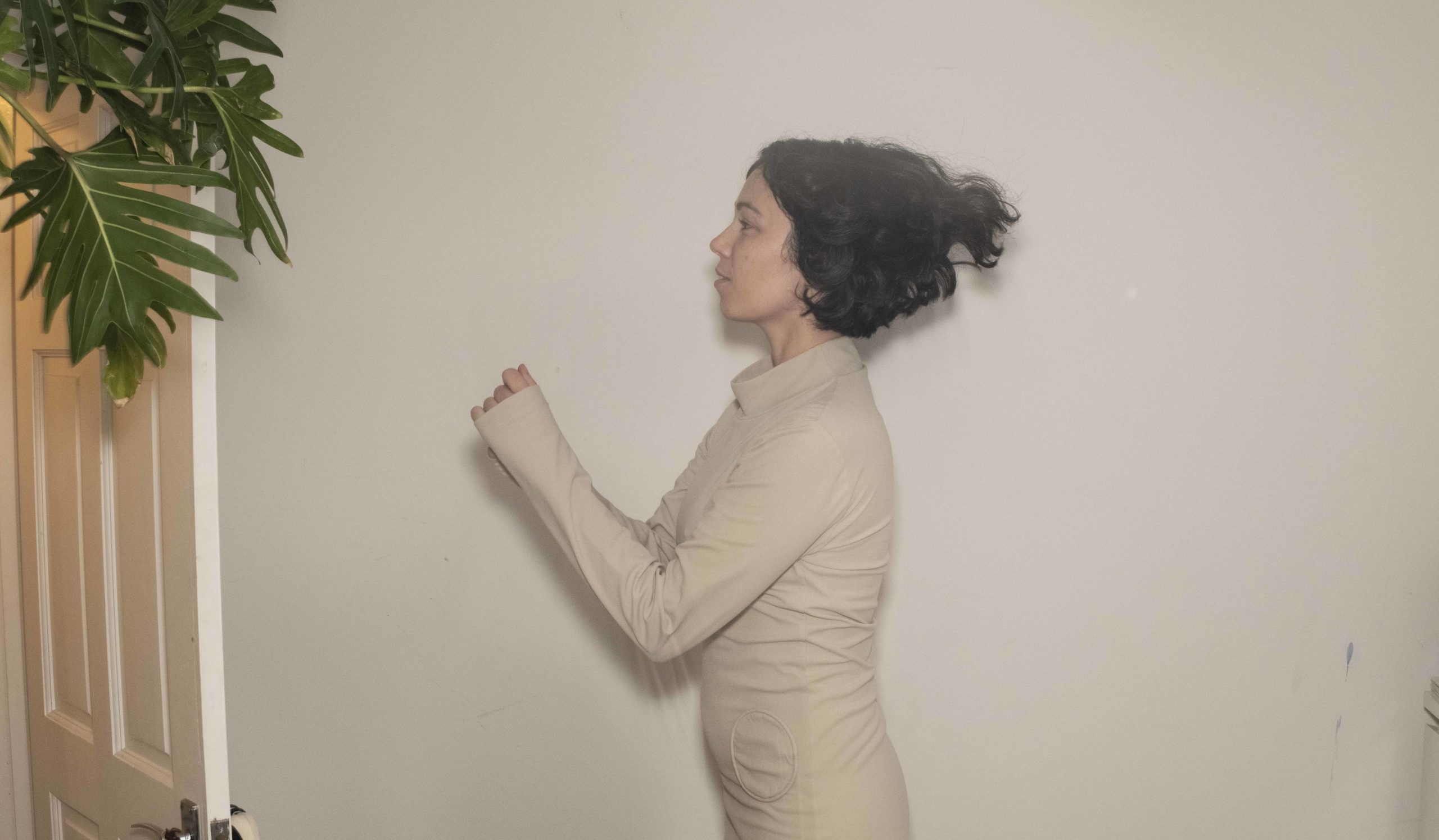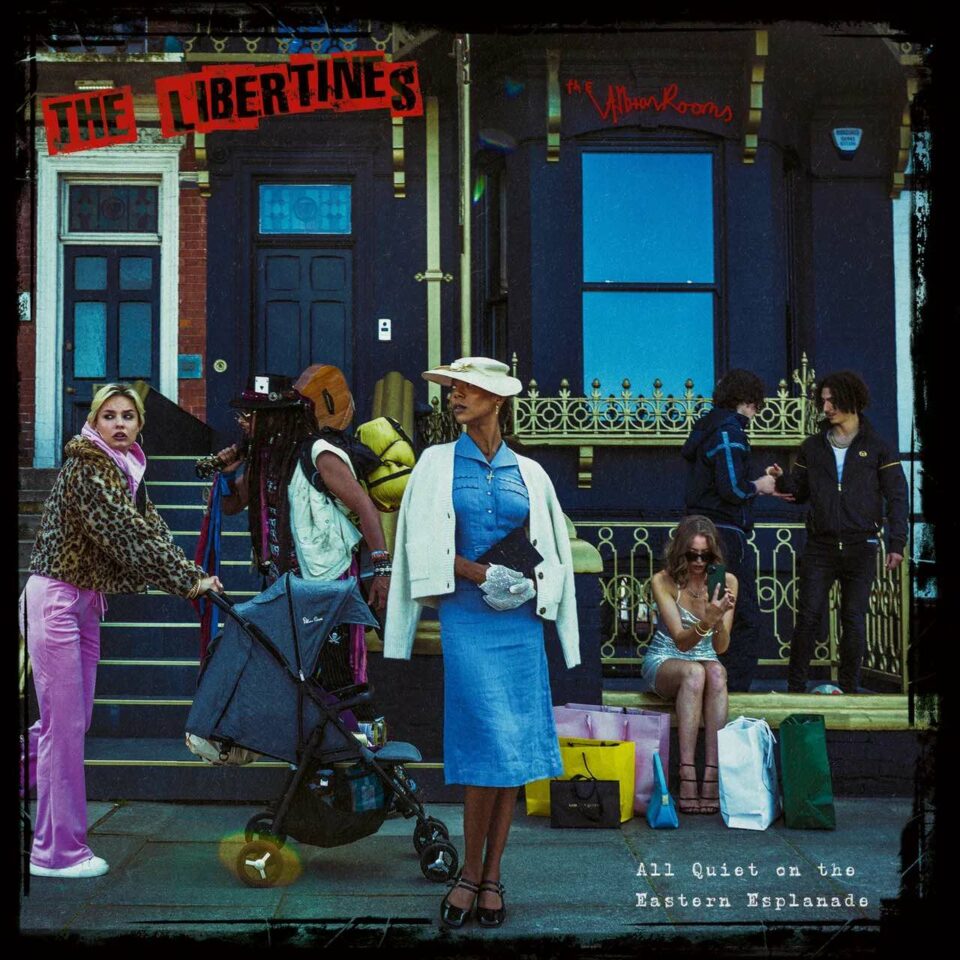As Joan Didion once wrote, “It is easy to see the beginnings of things and harder to see the ends.” During a turbulent three-year period for the electronic artist Kelly Lee Owens, comfort felt distant and inscrutable. Ruptures in her personal life sent her into a tailspin of mental anguish, cancelled tours, and illness. This is surprising to learn considering that in this time she was widely hailed as one of electronic music’s most promising, innovative newcomers.
The effervescent Welsh artist released her critically acclaimed debut album in 2017, which led to world-wide tours and collaborations with Jon Hopkins, St. Vincent and Björk, among others. Despite her plaudits and buzzy co-signers, Owens learned that life can still hurtle toward you at any stage. “You don’t think you’re gonna be able to get out of that rut or feel good again,” she recalls.
Thankfully, Owens began to move past her struggles while crafting her new album Inner Song—a gorgeous record that thrums with hard-fought wisdom and possibilities. Sonically, it oscillates between meditative, singer-songwriter soundscapes to boisterous techno bangers. It is a record deeply rooted in the process of healing and the importance of release.
We spoke to Owens about creativity, Radiohead, women in electronic music, and more.
What are your sources of inspiration these days?
This sounds so hippy in the Western world, but genuinely, it’s nature. Especially in these times we’re realizing the importance of the natural world more and more. It’s the place we can go to re-ground and connect with ourselves. It’s all we have, in the most beautiful sense. I’m from Wales, and people have been driving there to go walk in nature—so much so that people living in Wales are like, “You can’t all come here now.” There was a queue to climb Mount Snowden. There’s a reason why people are doing that.
What role has nature had on Inner Song?
They say, “Whatever the question, nature has the answer.” It’s very much been that for me with the personal journey I’ve been on for the past three years. No matter how I felt, if I could force myself to go on a walk, that would calm me instantly and bring me back to my true self. Nature is also the place I go to write thoughts down, just journaling my life and free-writing in a sense. It provides me that space to think, to process. It’s been that way for me my whole life growing up in Wales. I would daydream and go into my mom’s fields and write poetry. It sounds quite idyllic. I felt so blessed that I had those spaces. Space is so important, and we’re realizing that now more than ever.

Why do you think that Radiohead is the music of the apocalypse?
[Laughs] Because they aren’t afraid to go into the murky, dark, emotional places. I feel like a lot of people who try to avoid those emotions avoid Radiohead. Some people just can’t listen to it. It’s dreary! Maybe it’s me being from Wales, but it’s the melancholic elements of life. They soundtrack it by being brave enough to go to those places. I think all of us are feeling emotional now, no? It’s coming up and it’s coming out. We wanna release, we wanna feel, we wanna cry. People are so afraid to feel, and there’s a pain that comes from that inability to release emotion. For me, Radiohead has always been that place to be when I’m in an emotional state. I can flow with my emotions instead of against them, or blocking them out.
It’s apropos that your album begins with a cover of Radiohead, then.
And a bit blasphemous as a Radiohead fan. In Rainbows is one of my favorite records ever, so it’s kind of a bit weird and bold to do it, especially as the opening track. But the title is “Arpeggi.” When I think of “Arpeggi,” I think of synth straight away. I’ve always had, “If I were to do this song, it would sound like this,” as an idea. I never thought it would be on an album. I thought it would just be a single or something. But it sounded quite murky, and the arpeggios are rising. It felt like me, in a funny way, rising from the depths again. It genuinely represented the place I was coming back from. That track is a gateway into the next phase. It’s also just an ode to In Rainbows being one of the best-produced albums ever. That’s a headphone fucking album if I’ve ever heard one.
In that spirit, what do you think dance music’s role is in tumultuous times? It seems like you had an idea like this in mind since “Melt!” thematically touches on climate change.
Stuff that has messaging, like with climate change, doesn’t all have to be the same thing. It does have to be very clear and direct, but it can also infiltrate spaces like clubs. Dance music can do that in an indirect way, like with religion. Think about how much music has been written because of religion and what that does to spread a message. That could be good or bad. I think about a particular lyric from Britney Spears, “I was born to make you happy.” I always think of those lyrics like, “What the fuck?” [Laughs.] It sounds so basic, but there’s so much bad messaging for young people, women especially, in songs that are usually written by white dudes in castles somewhere.
“There’s so much bad messaging for young people, women especially, in songs that are usually written by white dudes in castles somewhere.”
I just think we need to be more mindful of the messaging, so that was a place where “Melt!” came from. I want people to pick up on stuff in places you wouldn’t normally expect. This can show up in interesting, weird samples in the music, too. If I can’t go to the Arctic Circle to sample melting ice, I can find it online. There’s so many amazing sounds in nature. It all comes back to nature.
Was there a particular moment or idea in the past three years that sparked your inspiration for Inner Song?
It was a slow unfolding, but I knew that I wanted to be honest and open. Even the production is a more open sound than the first record. One thing Kieran [Hebden] of Four Tet asked me after he heard me perform was, “Why are you hiding your vocals?” I kept that in mind and put the vocals higher in the mix. The lyrics are, at least on a base level, about certain situations that have been going on in my life. The messaging needed to be clear, so that informed the production as well. I wanted this honesty and rawness, but tinged with hope. Like with “On” being about having to move on from a situation in a three-minute song and then busting out in a three-minute dance track. You can transmute pain and darkness into something else.
Can you tell me a bit about the tough three-year period you mentioned?
It was a period of a lot of loss. Part of that loss is losing a part of yourself. Do you know the Saturn Return theory that people talk about? In your astrology birth chart, Saturn returns to the place you were first born every twenty-seven to twenty-eight years or so. Around that age there’s usually a lot of change in someone’s life where they ask themselves, “What am I doing? Am I happy?” Whatever needs to be shifted, whatever is unconscious becomes conscious during that period. That very much happened to me.
There were moments I couldn’t actually get out of bed because I was exhausted. The body is the last thing to show up. You can say you’re OK, but your body will eventually say, “No, we’re going to stop now.” I was forced to cancel shows. I had laryngitis three times that year, too. It’s all connected. That’s why nourishing yourself and giving space for those thoughts and emotions to be processed is vital for anyone.
What does having John Cale guest on the album mean to you?
It’s surreal to me, especially as a Welsh person. He’s a legend anyway, but especially in Wales you don’t get many psychedelic, sonic wizards. I did a session with him with my own vocals and that’s how we met. We kept in touch a little bit after that. Then I made this track, “Corner of My Sky,” and I could just hear his voice all over it. Me being me, I thought, “Well, you don’t ask, you don’t get,” so I boldly asked him if he felt connected to the track. And he doesn’t fuck about. If he doesn’t like something, he won’t do it.
I told him, if he connected to it, that the track is very much about nature and what is home for us in Wales. Wales has had a really tough history. It’s been a very oppressed country. We couldn’t speak our own language for a long time. There have been many hardships. When you come from a place like that, no wonder there’s a resilience through song, and there’s a pride that’s not nationalistic. It’s basically a working-class country. People have never had much, but we do have nature and song.
He sings in Welsh on the song, which I encouraged him to do. He was a bit worried about that, but I think it worked out beautifully, this psychedelic lullaby. When the arrangement was finished, I cried. I’m so grateful that he lent his talent and energy to my world.
You’ve been very vocal about your own self-sufficiency in producing music as well as visibility, employment, and respect for women in electronic music. Do you think the landscape for women in the scene has changed much in the past few years?
On the outside, in terms of festivals and people being held accountable, a lot of it feels like people are being forced to do it. But that’s fine. If that’s what it takes. In that sense, the issues and discrepancies are being highlighted. At least festivals and promoters are being challenged on this, which is really good.
“If I put my voice on something, that automatically means to people that I’m just a singer and I sang a pretty little vocal line—even if it reads ‘Jon Hopkins and Kelly Lee Owens,’ not featuring.”
But I recently made the song “Luminous Spaces” with Jon Hopkins. He sent me the stems, I remixed it, re-arranged it, did all the production bits, new synth lines. Then I wrote new vocals and lyrics on top of everything I did. Then Jon did extra production bits on top of what I’d done. Then, when it came out, people said “Oh, Kelly’s voice, that’s nice, someone that sang on top. But Jon’s production is amazing!” I was just like, “What the fuck?”
If I put my voice on something, that automatically means to people that I’m just a singer and I sang a pretty little vocal line—even though it reads “Jon Hopkins and Kelly Lee Owens,” not featuring. Jon is an incredible producer, but he was adding to stuff I’d already done, which was huge. It’s so frustrating to me. I had to mention this to Jon’s team before the press release came out, but it’s sadly still misinterpreted. I actually think we’re a lot further away than we should be on that topic.
Does Inner Song have a mission statement?
It’s about being hopeful for the future and knowing better days will come. That’s so cheese, but it genuinely is the truth. You don’t think you’re gonna be able to get out of that rut or feel good again. But they’re all processes that we have to go through. It’s about being a part of the collective consciousness, knowing that we all have those moments, and it’s OK. FL









